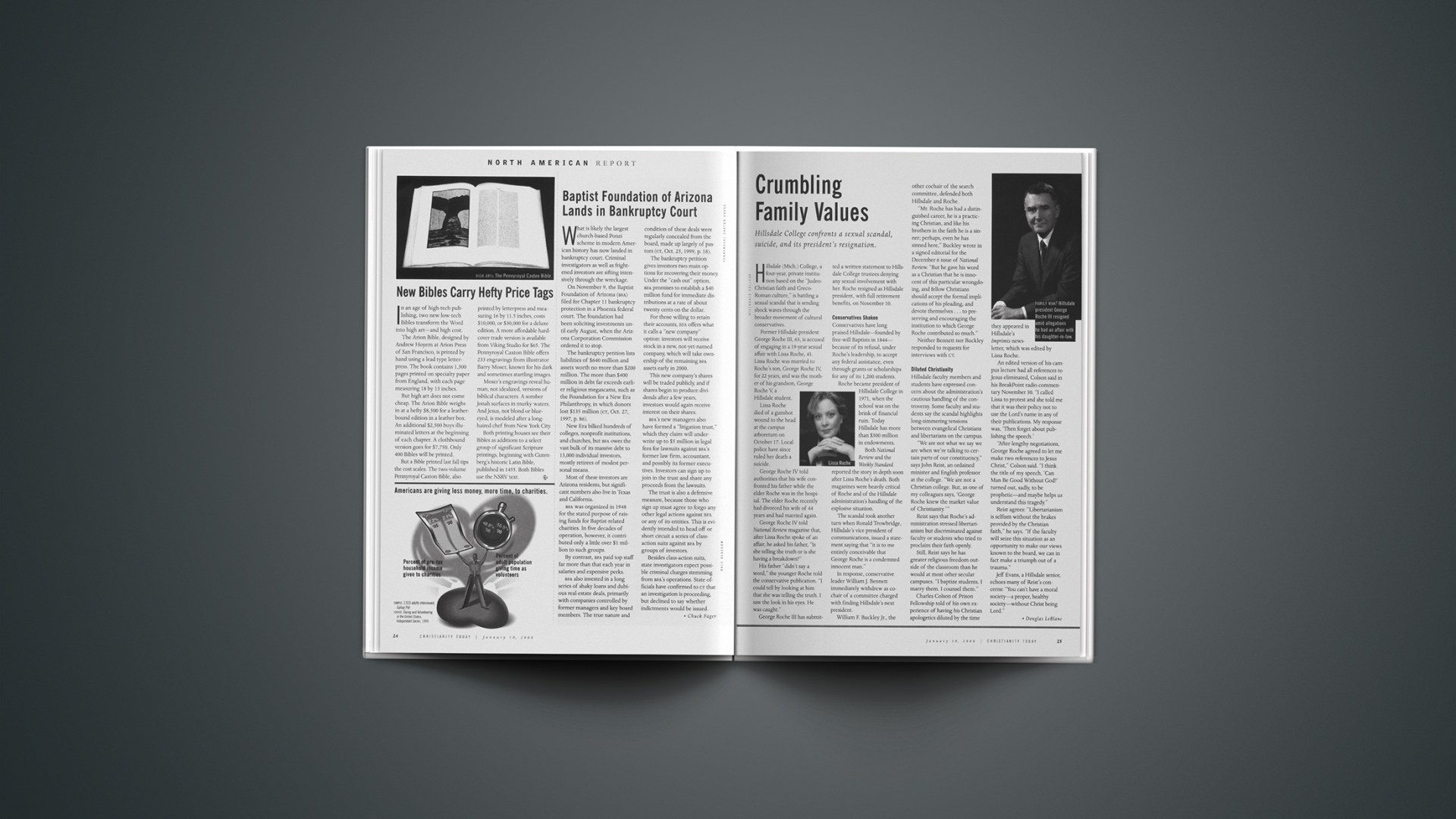Hillsdale (Mich.) College, a four-year, private institution based on the "Judeo-Christian faith and Greco-Roman culture," is battling a sexual scandal that is sending shock waves through the broader movement of cultural conservatives.
Former Hillsdale president George Roche III, 63, is accused of engaging in a 19-year sexual affair with Lissa Roche, 41. Lissa Roche was married to Roche's son, George Roche IV, for 22 years, and was the mother of his grandson, George Roche V, a Hillsdale student.
Lissa Roche died of a gunshot wound to the head at the campus arboretum on October 17. Local police have since ruled her death a suicide.
George Roche IV told authorities that his wife confronted his father while the elder Roche was in the hospital. The elder Roche recently had divorced his wife of 44 years and had married again.
George Roche IV told National Review magazine that, after Lissa Roche spoke of an affair, he asked his father, "Is she telling the truth or is she having a breakdown?"
His father "didn't say a word," the younger Roche told the conservative publication. "I could tell by looking at him that she was telling the truth. I saw the look in his eyes. He was caught."
George Roche III has submitted a written statement to Hillsdale College trustees denying any sexual involvement with her. Roche resigned as Hillsdale president, with full retirement benefits, on November 10.
Conservatives Shaken
Conservatives have long praised Hillsdale—founded by free-will Baptists in 1844—because of its refusal, under Roche's leadership, to accept any federal assistance, even through grants or scholarships for any of its 1,200 students.
Roche became president of Hillsdale College in 1971, when the school was on the brink of financial ruin. Today Hillsdale has more than $300 million in endowments.
Both National Review and the Weekly Standard reported the story in depth soon after Lissa Roche's death. Both magazines were heavily critical of Roche and of the Hillsdale administration's handling of the explosive situation.
The scandal took another turn when Ronald Trowbridge, Hillsdale's vice president of communications, issued a statement saying that "it is to me entirely conceivable that George Roche is a condemned innocent man."
In response, conservative leader William J. Bennett immediately withdrew as cochair of a committee charged with finding Hillsdale's next president.
William F. Buckley Jr., the other cochair of the search committee, defended both Hillsdale and Roche.
"Mr. Roche has had a distinguished career, he is a practicing Christian, and like his brothers in the faith he is a sinner; perhaps, even he has sinned here," Buckley wrote in a signed editorial for the December 6 issue of National Review. "But he gave his word as a Christian that he is innocent of this particular wrongdoing, and fellow Christians should accept the formal implications of his pleading, and devote themselves … to preserving and encouraging the institution to which George Roche contributed so much."
Neither Bennett nor Buckley responded to requests for interviews with Christianity Today.
Diluted Christianity
Hillsdale faculty members and students have expressed concern about the administration's cautious handling of the controversy. Some faculty and students say the scandal highlights long-simmering tensions between evangelical Christians and libertarians on the campus.
"We are not what we say we are when we're talking to certain parts of our constituency," says John Reist, an ordained minister and English professor at the college. "We are not a Christian college. But, as one of my colleagues says, 'George Roche knew the market value of Christianity.' "
Reist says that Roche's administration stressed libertarianism but discriminated against faculty or students who tried to proclaim their faith openly.
Still, Reist says he has greater religious freedom outside of the classroom than he would at most other secular campuses. "I baptize students. I marry them. I counsel them."
Charles Colson of Prison Fellowship told of his own experience of having his Christian apologetics diluted by the time they appeared in Hillsdale's Imprimis newsletter, which was edited by Lissa Roche.
An edited version of his campus lecture had all references to Jesus eliminated, Colson said in his BreakPoint radio commentary November 30. "I called Lissa to protest and she told me that it was their policy not to use the Lord's name in any of their publications. My response was, 'Then forget about publishing the speech.'
"After lengthy negotiations, George Roche agreed to let me make two references to Jesus Christ," Colson said. "I think the title of my speech, 'Can Man Be Good Without God?' turned out, sadly, to be prophetic—and maybe helps us understand this tragedy."
Reist agrees: "Libertarianism is selfism without the brakes provided by the Christian faith," he says. "If the faculty will seize this situation as an opportunity to make our views known to the board, we can in fact make a triumph out of a trauma."
Jeff Evans, a Hillsdale senior, echoes many of Reist's concerns: "You can't have a moral society—a proper, healthy society—without Christ being Lord."
Douglas LeBlanc is Associate Editor of Christianity Today.
Related Elsewhere
See related coverage of the story in the Washington Post, the Chronicle of Higher Education, and Lingua Franca.
Hillsdale College, and its Imprimis magazine, are online, though no discussion of the Roche scandal were apparent on either site.
Copyright © 2000 Christianity Today. Click for reprint information.










